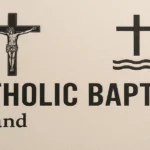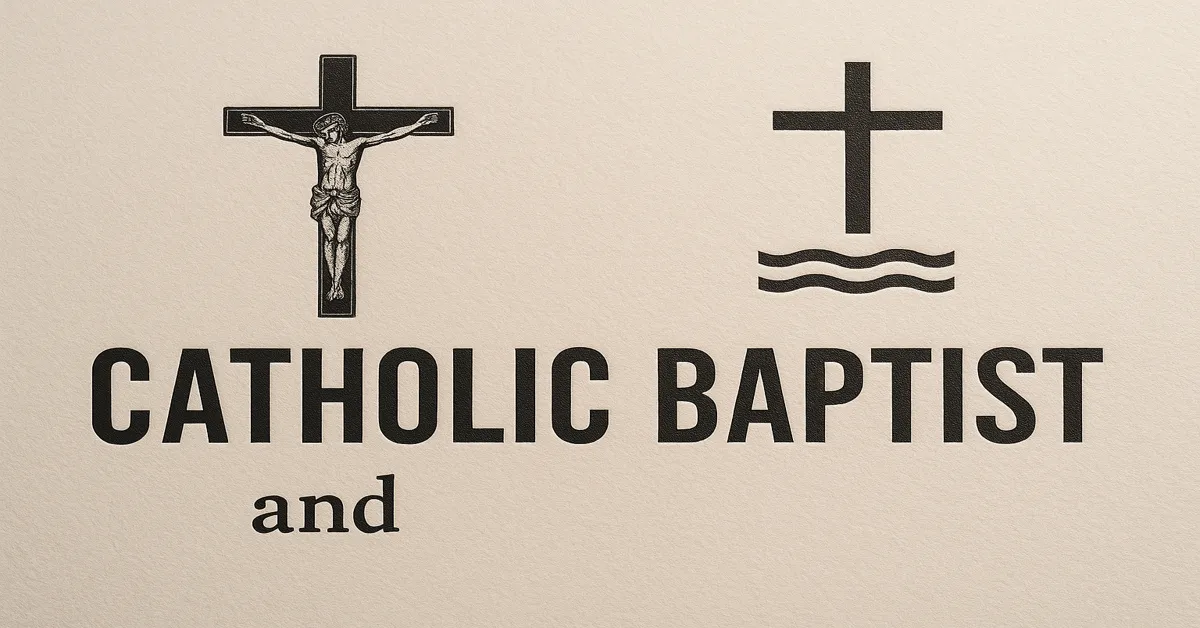At first glance, Catholics and Baptists may seem to share much: belief in Jesus Christ, reverence for the Bible, and the structure of Sunday worship. But beneath these surface similarities lie profound and defining differences—rooted in theology, tradition, and history—that shape not only how each group practices their faith, but how they understand the role of church, salvation, authority, and community. (Difference Between Catholic and Baptist)
This article offers an in-depth look into what truly distinguishes Catholics from Baptists, answering the questions many seekers and observers have when encountering these two influential branches of Christianity. (Difference Between Catholic and Baptist)
1. Origins and Historical Background
1.1. Catholicism: The Original Church
The Roman Catholic Church traces its lineage directly to Jesus Christ and the apostles, particularly the Apostle Peter, considered by Catholics to be the first pope. Catholicism became the dominant form of Christianity after the legalization of the religion in the Roman Empire in the 4th century and has remained a global religious powerhouse ever since. (Difference Between Catholic and Baptist)
Its long history includes councils, creeds, and a tradition of centralized authority rooted in the Vatican and the papacy. Catholicism defines itself as the universal church, meant for all people, in all times.
1.2. Baptists: A Reformation-Era Offshoot
Baptists emerged out of the 17th-century English Reformation, influenced by earlier Protestant movements like the Anabaptists and Puritans. They are part of the wider Protestant tradition, which split from Catholicism over issues such as papal authority, salvation, and biblical interpretation. (Difference Between Catholic and Baptist)
Unlike Catholics, Baptists emphasize individual conscience, local church autonomy, and a “believers-only” baptism—a rejection of infant baptism that remains one of their most distinctive features.
2. Scripture and Authority
2.1. The Role of the Bible
Both Catholics and Baptists revere the Bible as the sacred word of God. But their relationship to it differs:
- Baptists typically hold to sola scriptura, a Reformation principle meaning that Scripture alone is the final authority on all matters of faith and practice. Interpretations are often individual, guided by prayer and community study.
- Catholics, while deeply rooted in Scripture, also emphasize Sacred Tradition—teachings handed down through the apostles and church councils. For Catholics, both Scripture and Tradition are authoritative, interpreted through the Magisterium, or teaching authority of the Church.
2.2. Authority Structure
- Catholicism is hierarchical. The Pope, as Bishop of Rome, is the spiritual leader of over a billion Catholics worldwide. Beneath him are cardinals, bishops, priests, and deacons. The church is centralized and universal.
- Baptist churches are typically congregational, meaning each local church is self-governing. There are associations and conventions (like the Southern Baptist Convention), but no bishop or pope governs them. Decisions are made locally.
3. Baptism: A Fundamental Divergence
Baptism is perhaps the most visible and theological difference between the two traditions.
3.1. Infant vs. Believer’s Baptism
- Catholics baptize infants, believing the sacrament washes away original sin and initiates the child into the church. Baptism is a means of grace and the beginning of a lifelong journey of faith.
- Baptists baptize only those who consciously profess faith in Jesus, known as believer’s baptism. It’s viewed as a public declaration of faith, symbolic rather than sacramental. Baptism is by full immersion, unlike the Catholic practice which may involve pouring or sprinkling.
3.2. Theological Implications
To Catholics, baptism is necessary for salvation, though exceptions exist. For Baptists, baptism is not salvific, but an act of obedience that follows conversion.
4. The Eucharist (Communion): Real Presence or Symbol?
4.1. Catholic View: Transubstantiation
Catholics believe in transubstantiation—that during Mass, the bread and wine become the actual Body and Blood of Christ, though the appearance remains unchanged. It is considered the source and summit of the Christian life.
Mass is not just a remembrance but a sacrificial offering, re-presenting the once-for-all sacrifice of Christ in an unbloody manner.
4.2. Baptist View: Memorial Meal
Baptists view communion as a symbolic act—a remembrance of Jesus’ sacrifice. It is not a sacrament, but an ordinance—a command given by Christ, without supernatural transformation of the elements.
Participation is often less frequent (monthly or quarterly) and typically reserved for baptized believers.
5. Salvation and Grace
5.1. Catholic Perspective
Catholics believe in a cooperative model of salvation involving faith, good works, and the sacraments. Grace is imparted through the church’s sacramental life, and salvation is seen as a journey rather than a single event.
One must remain in a state of grace through confession, Mass attendance, and charity.
5.2. Baptist Perspective
Baptists believe salvation is by grace alone through faith alone in Christ alone. It is a definitive moment of conversion, often marked by a personal prayer of commitment. Works are important, but only as evidence of genuine faith—not as a means of earning salvation.
6. Worship and Liturgy
6.1. Catholic Worship: Structured and Sacramental
Catholic Mass is deeply liturgical, following a prescribed order that includes readings, prayers, rituals, and the Eucharist. Visuals such as icons, candles, and statues play a role in spiritual reflection.
The structure connects Catholics globally, offering a universal experience of worship.
6.2. Baptist Worship: Informal and Scripture-Centered
Baptist services are typically more informal and sermon-focused, with a strong emphasis on preaching and congregational singing. Services may vary greatly between churches, reflecting the autonomy of local congregations.
While still reverent, worship is centered on the Word rather than ritual.
7. The Role of Mary and the Saints
7.1. Catholics: Veneration and Intercession
Catholics venerate (not worship) Mary and the saints, asking for their intercession. Mary holds a special place as the Mother of God and Queen of Heaven. Statues and feast days reflect this honor.
7.2. Baptists: Christ Alone
Baptists do not pray to saints or Mary, believing that Jesus Christ is the sole mediator between God and humanity. While Mary is respected, she is not venerated or seen as intercessory.
8. Confession and Forgiveness
- Catholics practice confession to a priest, believing that priests, acting in persona Christi, have the authority to absolve sins through the sacrament of Reconciliation.
- Baptists teach that confession is made directly to God. There is no human intermediary; Christ alone forgives sins.
9. Clergy and Celibacy
- Catholic priests must be male and are usually celibate, though some exceptions exist (such as Eastern Catholic rites).
- Baptist pastors can be married and are selected by congregational vote. Some Baptist traditions also ordain women, though this varies widely.
10. Culture, Community, and Global Reach
10.1. Catholicism
With over 1.3 billion members, Catholicism has a massive global presence. The Church has played key roles in education, healthcare, politics, and social justice for centuries.
Its community life is structured around parishes, religious orders, and global solidarity.
10.2. Baptists
Baptists, particularly in the U.S. and Africa, form one of the largest Protestant groups. Known for championing religious liberty, local autonomy, and evangelism, they often take strong stands on moral and social issues.
The Southern Baptist Convention is the largest Baptist denomination globally.
11. Major Similarities (Amidst Differences)
Despite their divergences, Catholics and Baptists share several core beliefs:
- The Trinity: One God in three persons—Father, Son, and Holy Spirit.
- The deity and resurrection of Jesus.
- The authority of Scripture, though interpreted differently.
- The importance of faith and moral living.
Final Thoughts: Tradition or Autonomy?
In essence, the difference between Catholic and Baptist Christianity boils down to this: centralized tradition versus decentralized interpretation. Catholics find strength in continuity, sacramental life, and global unity. Baptists find vitality in individual faith, Scripture-alone theology, and congregational freedom.
Both traditions, however, reflect genuine efforts to follow Christ—each shaped by distinct histories and visions of the Christian life. Understanding these differences doesn’t merely separate them—it enriches the broader Christian story and invites deeper dialogue among believers. (Difference Between Catholic and Baptist)
FAQs
1. What is the main difference between Catholics and Baptists?
The main difference lies in authority and practice. Catholics follow a centralized Church structure with traditions and sacraments, while Baptists emphasize individual interpretation of the Bible, believer’s baptism, and local church autonomy.
2. Do both Catholics and Baptists believe in Jesus Christ?
Yes. Both Catholics and Baptists believe that Jesus Christ is the Son of God, the Savior of humanity, and the central figure of the Christian faith. However, their views on how to follow Him and practice faith differ significantly.
3. Why don’t Baptists baptize infants like Catholics do?
Baptists believe baptism should follow a personal confession of faith, which infants cannot make. Therefore, they practice believer’s baptism—only baptizing individuals old enough to choose faith for themselves.
4. How do Catholics and Baptists differ in their view of communion?
Catholics believe in transubstantiation, where the bread and wine become the actual Body and Blood of Christ. Baptists view communion as symbolic, a memorial act that honors Jesus’ sacrifice without changing the nature of the elements.
5. Can a person be both Catholic and Baptist?
No, not fully. Catholicism and Baptism have theologically incompatible beliefs, particularly on authority, sacraments, and salvation. While someone might be influenced by both traditions, being an active member of both churches simultaneously is not typically possible.







